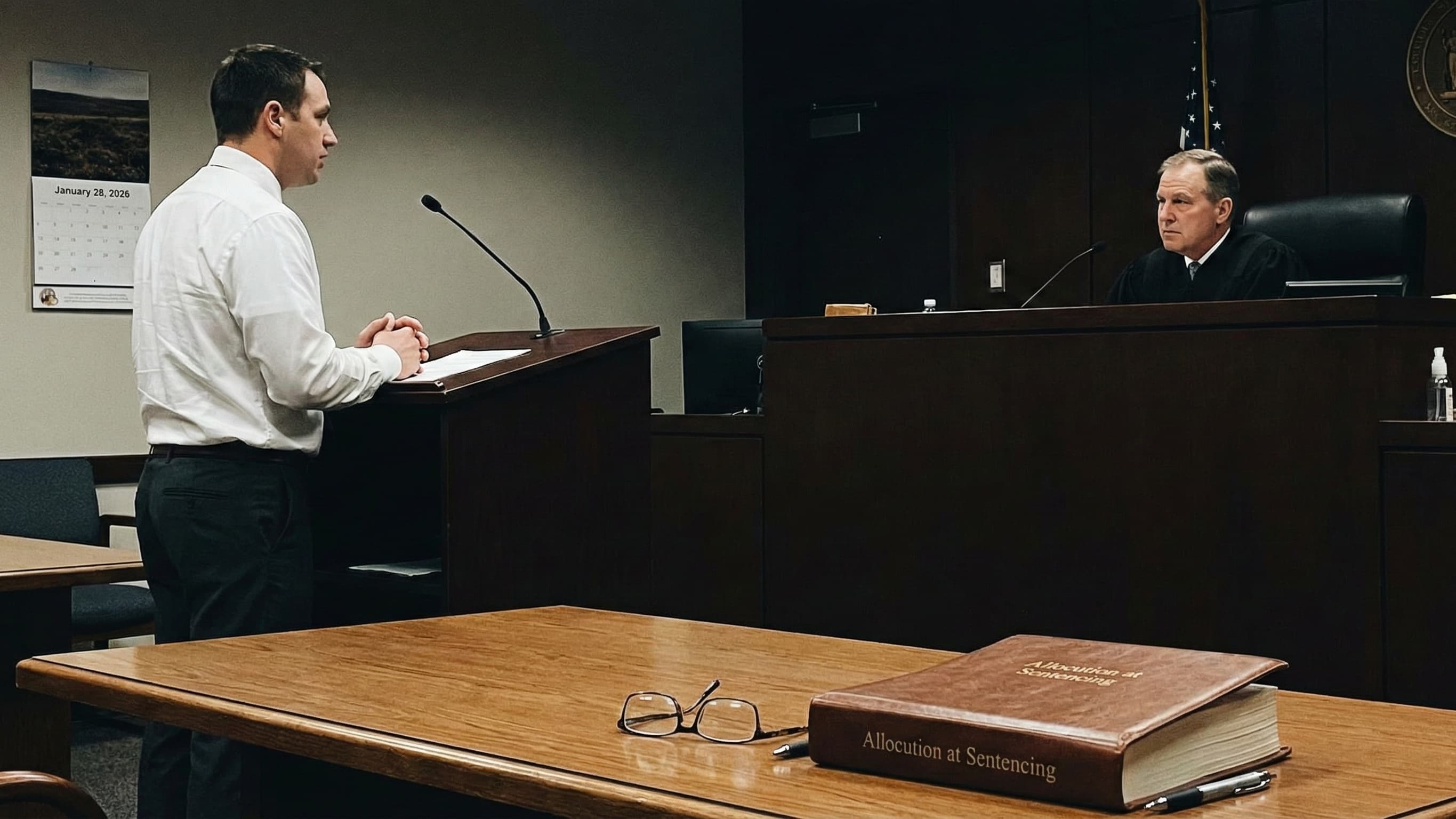Anyone facing a sentencing hearing should think about allocution early. It's a concept that doesn't often get much attention until the days just before sentencing. In our view, a person should start thinking about allocution at the start of the journey. Given the statistics on conviction rates, I would recommend that a person begins thinking about allocution as soon as a person learns that prosecutors intend to bring a criminal charge.
The allocution phase of sentencing opens an opportunity to influence the outcome. Rules require a judge to open an opportunity for a person to give a statement, but the effectiveness of the statement depends on preparation.
What is Allocution?
Allocution opens an opportunity to address the court before sentencing. A person who prepares well should humanize the process, providing the judge with insight into past influences and experiences. If a person pleaded guilty, he should take responsibility for and express remorse. If a jury convicted the person, he should use the opportunity to share more of his life story and what he has learned from the process.
In the federal judicial system, Rule 32 ensures judges address defendants directly, giving the person facing the loss of liberty a chance to speak.
From my view, preparation before sentencing opens opportunities to build a connection. And a person who has prepared well should know what to say when addressing the judge.
The most effective allocutions are sincere and forward-looking. Instead of making excuses, people should talk about the steps they've taken to make amends.
Allocution Data
Studies reveal that judges overwhelmingly believe allocution has a purpose beyond affecting sentencing outcomes. I provide a link to an insightful article by U.S. District Judge Mark W. Bennett that reinforced our view on the power of effective allocution.
Judge Bennett's article highlights allocution as an often-overlooked, yet powerful opportunity for people facing sentencing to positively influence their outcomes. He stresses the importance of authenticity, genuine remorse, and the importance of making clear plans that show a commitment to living a law-abiding, contributing life.
In his article, he wrote that more than 85% of judges he surveyed said allocution offers significant benefits. Besides a possibility to influence the sentence, allocution lays the groundwork for future benefits in the self-advocacy process. I think it's important to draw a line in the sand, and record the ways that a person intends to prepare for success in the future.
While a formula doesn't exist to guarantee an outcome, I can offer insights that I've learned from interviewing federal judges:
Reflect and Accept Responsibility
Judges want genuine remorse, not rehearsed platitudes. Spend time reflecting on the actions that led to the offense, their impact on others, and their consequences. Accepting responsibility is the foundation for a persuasive allocution. If a person preserves appeal rights, then use the opportunity to help the judge get a sense of who you are as an individual, and what you've learned from the experience. Avoid assigning blame to external factors.
Be Sincere and Authentic
Judges can discern the difference between genuine remorse and a performance. Speak from the heart, using your own words. Rehearse your speech for clarity, but avoid memorizing a script that can feel detached.
Be Prepared
Verbose statements can dilute a message. Prepare in advance, but keep your allocution focused. Strike a balance between explaining your actions, expressing remorse, and showing your plans for the future. Judges recommend brevity and precision over lengthy monologues. I'd say the sweet spot is between two and seven minutes.
Focus on Concrete Plans for the Future
Courts often look for evidence that the person understands the gravity of the crime and the way the crime has influenced, or victimized others. Also, show a realistic and actionable strategy to avoid recidivism. Discuss how you’ll contribute to society, future goals, and accountability measures you’ve set for yourself. Consider the ways you've worked to make amends. For example, many judges are impressed when defendants present a detailed plan for employment or personal growth.
Acknowledge the Victim’s Perspective
Again, take time to recognize how the crime affected victims and their families. Judges appreciate when defendants offer sincere apologies or express understanding of the crime’s broader impact. If you think your crime doesn't have a victim, stop thinking about your perspective and start thinking about the judge's perspective. If you insist there are no victims in your crime, then perhaps it's best not to mention this at all, or to refrain from saying anything. Judges do not want to hear a person say there isn't a victim.
Engage with the Judge
Although emotions may be appropriate, try to make eye contact with the judge. Reading monotone from a sheet of paper or avoiding eye contact can diminish the allocution’s effectiveness. A respectful, conversational tone can make a significant difference. Think of this process as the biggest sale in your life.
Avoid Common Pitfalls
Spontaneous Religious Proclamations: Judges are skeptical of last-minute declarations of religious transformation.
Blaming: Avoid positioning yourself as a victim of circumstance.
Promises without Action: Grand statements (“I’ll never commit a crime again”) are less effective than clear, actionable strategies.
The Opportunity
Use allocution as an opportunity to start rewriting your story. Being accountable in court today can lay the foundation for a brighter future tomorrow.
Self-reflection Questions:
If you were given an opportunity to reflect on your past actions, what would you say?
How can you use difficult moments in life to demonstrate accountability and plan for the future?
What steps can you take today to ensure that your words align with your actions moving forward?
Remember, no challenge is insurmountable when met with discipline, strategic thinking, and the courage to grow from adversity. Take on allocution not as an obligation, but as an opportunity to take ownership of your next chapter.

